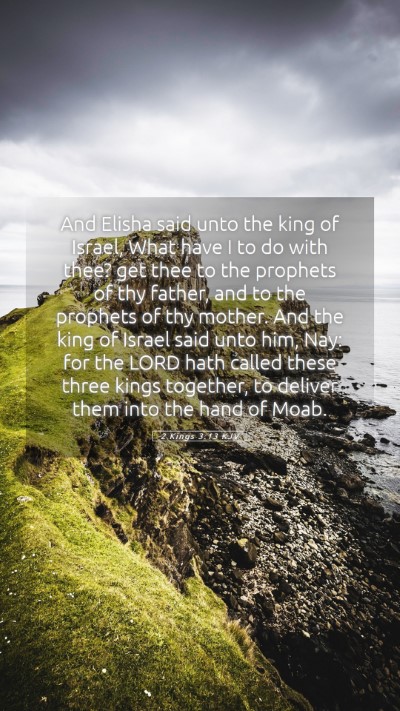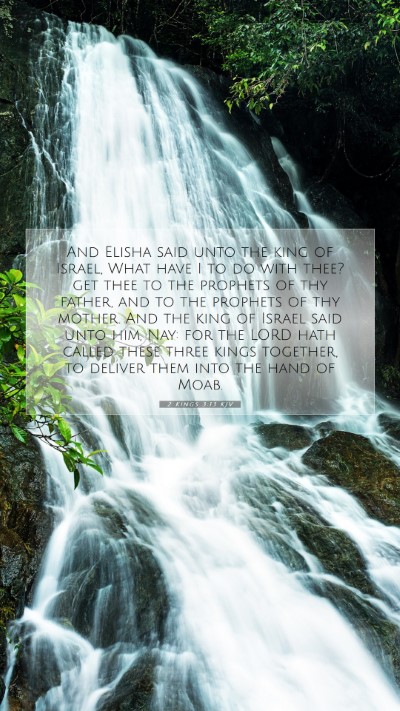Understanding 2 Kings 3:13
In this passage from 2 Kings 3:13, the prophet Elisha confronts the king of Israel regarding the dire situation facing the Israelites. This verse highlights themes of divine communication, the importance of godly leadership, and the challenges faced by God’s people. Through insights from public domain commentaries, we can explore the rich meaning contained within this scripture.
Bible Verse Meaning
This verse states:
“And Elisha said unto the king of Israel, What have I to do with thee? get thee to the prophets of thy father, and to the prophets of thy mother. And the king of Israel said unto him, Nay; for the Lord hath called these three kings together to deliver them into the hand of Moab.”
Verse Insights
- Context of Prophetic Ministry: Elisha’s response reveals a critical moment in Israel's kingship and prophetic voice. According to Matthew Henry, Elisha indicates a refusal to engage with kings who have turned away from true prophets and worship.
- Godly Counsel vs. Secular Authority: Albert Barnes elucidates that Elisha segregates himself from the kings' concerns, suggesting reliance on pagans’ idols has led them astray, urging the king to seek the counsel of legitimate prophets instead.
- Divine Judgment and Deliverance: Adam Clarke articulates that the narrative underscores God’s sovereignty over the nation and illustrates the consequences of their leaders' choices. The king’s plea reflects ignorance of the divine plan.
Exploring the Themes
The themes encapsulated in this verse can be further analyzed:
- Rejection of False Prophets: Elisha's remonstration serves as a prophetic warning to avoid false idols and seek genuine guidance from God’s chosen messengers.
- The Sovereignty of God: The acknowledgment that God is in control, even in chaotic circumstances, as highlighted by the king's admission of the situation’s gravity.
- The Role of Leadership: This verse emphasizes the significance of righteous leadership and the responsibility of kings to uphold God’s commandments.
Application in Daily Life
Understanding scripture like 2 Kings 3:13 provides valuable lessons applicable in contemporary life:
- Discernment in Leadership: Recognizing the necessity to seek counsel from godly sources, especially in critical situations.
- Rejection of Compromise: Standing firm against the temptation of compromising one’s beliefs for the sake of convenience or secular influence.
- Trusting God's Plan: Acknowledging divine sovereignty in our struggles, expecting God to provide guidance and support amidst turmoil.
Cross References
Additionally, related scripture passages that deepen our understanding of 2 Kings 3:13 include:
- Jeremiah 23:16: A warning against following false prophets.
- Isaiah 30:10: The people’s preference for falsehood over the truth.
- 1 Kings 22:6: The importance of seeking the true prophets of God for guidance.
Conclusion
This exploration of 2 Kings 3:13 not only enhances our bible verse understanding and bible verse interpretations but also emphasizes the necessity of engaging with God’s word in a profound way. By analyzing the insights provided by esteemed commentaries, believers can effectively apply the teachings of scripture to their own lives and decisions.


